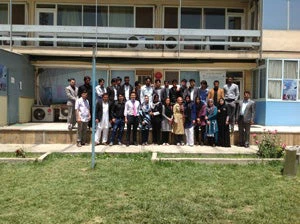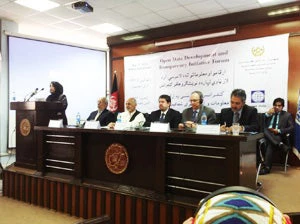
Last November, the first open data mission revealed Afghans’ interest and commitment to foster knowledge sharing, collaboration and openness for a broader and targeted engagement in Afghanistan. In my blog, Afghanistan’s First Open Data Dialogue Delivers, I described my first-hand experience on Afghans enthusiasm about improving data dissemination, national dialogue and partnership between users and producers of statistics, and the drive for more effective aid and technical assistance through better coordination and alignment to the agreed National Statistical Plans.
In May of this year, the second open data mission delivered a scaled up version elaborating on the open concept, a comprehensive, thorough outline for what “openness” would entail and laying the groundwork for open government. The mission started in Herat, with a one-day workshop on open development and open data with the aim to drive demand for open government. In Kabul, a series of meetings and workshops were held to set the stage and test the waters for an open initiative.
While most of this mission involved meetings discussing and explaining the open philosophy, the value and benefits of open data and open development, I moderated the Ideation session, as part of a one-day outreach event to students. The structure of the ideation session, allowed participants in groups of three to four students to discuss problem areas identified by the various ministries using current data and to work on conceptualizing ideas and solutions. Our participants generated innovative ideas using open datasets and other topics identified using a multi-sectoral approach. This platform created a space where students were given the opportunity to exchange ideas with their peers and to present these ideas to the governmental counterparts, allowing us a glimpse into the future of what open development would mean for an open government in Afghanistan.
At the end of the session, we received feedback from students with one student saying, “It’s a good program for us and I like it.” Another student offered this insight, “We hope to see more World Bank trainings similar to this [referring to the ideation session] all over the country.” From these few comments, it is clear that the students enjoyed the ideation activity and are positive about the future of Afghanistan with an openness that is possible. Moreover, during informal discussions over lunch, I witnessed a younger generation of empowered, hopeful girls chatting about their optimistic views of a brighter and prosperous Afghanistan—an Afghanistan with more opportunities for young people to get involved in a meaningful way, that encourages collaboration with government, private and public sectors.
But, How does Open Government reduce poverty (in Afghanistan)?
By the end of the mission, demand for scaling up the open data and open development, transition into an open government agenda and came from the Central Statistics Organization (CSO), Ministry of Public Health (MoPH), Ministry of Finance (MoF) and the Kabul municipality. In the case of these ministries, we saw a jolt in client demand and a resounding pull for not only scaling up, but, implementing an open government pilot across Afghanistan. This mission set the parameters for successfully discussing the open government initiative, suggesting that: open data and open development mean open government, and open government can bring about effective change in Afghanistan –through increased transparency and higher citizen engagement in policy decision –to move the country in the direction of poverty reduction and shared prosperity.
The general role of the open government pilot aims to develop access and availability of data in a transparent manner. While we are at a nascent stage of laying the foundations for open government in Afghanistan, the excitement surrounding this is all too real with poverty reduction and shared prosperity at the frontlines.
By establishing a cross-sectoral approach with the various ministries, the open government agenda creates a supply chain that ensures transparency which enables accountability by promoting citizen and/or public engagement to effect change, engage in policy and hold government responsible by using evidence based data for the decision-making processes and for proper planning. I believe poverty reduction and shared prosperity can be achieved with the open government agenda, which would effectively benefit the livelihood of Afghans and the developmental growth of Afghanistan.


Join the Conversation